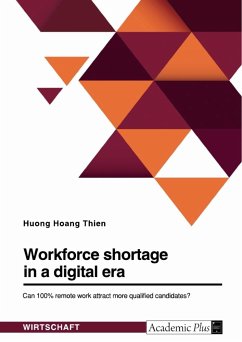Master's Thesis from the year 2023 in the subject Leadership and Human Resources - Recruiting, grade: 1,0, , language: English, abstract: What will happen if there aren't enough talents to fill the market in the future due to the demographical change? This study focuses on the potential of offering 100% remote work to counteract the workforce shortage in Germany. An empirical study has been conducted as an online survey to gain an overview of Germany's 100% remote job market. In a fast-changing world, digital transformation has become an evitable process for companies to adapt to new technologies and market trends. The digital transformation in Germany has been significantly impacted by the COVID-19 pandemic, positively and negatively. On the one hand, the pandemic forced German companies to embrace new technology more quickly and adapt to remote work. However, on the other hand, it pointed out Germany's weaknesses in digital infrastructures and cybersecurity. Additionally, many German companies face a shortage of workers due to digital transformation. Another reason that causes workforce shortage is demographical change. Companies cannot operate their business correctly, increase revenue, or drive innovations to survive in a competitive market without suitable candidates. Furthermore, the digital revolution shaped the current digital generations, as potential workers exhibit different digital behaviors and preferences. Therefore, companies must know them and their work preferences to fill the workforce shortage gap. Remote working as a sub-trend of the mega trend New Work has become the new standard for workers, especially since the pandemic. However, there aren't any specific regulations regarding remote work in Germany yet. In general, remote work provides workers, e.g., more freedom and a better work-life balance. Nevertheless, remote work also has the downside, such as workers experiencing isolation and loneliness due to the lack of social contact with co-workers, less productivity outside of the office, etc. For companies, offering remote work gives them complete access to the talent pools, including freelancers as external workers, reducing costs due to fewer offices; being more attractive to job seekers. But on the other side, remote leadership has become a big challenge for leaders. Furthermore, companies have to deal more with cyber security. When everything's going remotely, companies have become an easier target of cyber-attacks.







